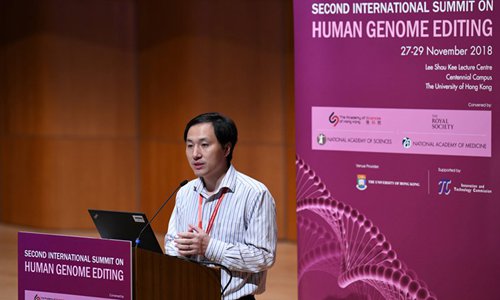
Chinese scientist He Jiankui presents his gene-editing experiment at the Second International Summit on Human Genome Editing in Hong Kong on Wednesday. Photo: AFP
China is requiring all universities and research institutes to report illegal gene-editing experiments, a month after associate professor He Jiankui's gene-edited babies sparked concerns ethics concerns around the world.
The notice from the Department of Science and Technology under the Chinese Ministry of Education (MOE) requires the reporting of all illegal experiments - considered those that allow edited genes to survive more than 14 days - that were conducted after January 1, 2013.
The notice was made public on Tuesday on the website of the South China Agricultural University in Guangzhou, South China's Guangdong Province, which isand requiring requires relevant departments at the university to submit results by Thursday noon.
It has been removed as of press time.
A staff member from the science and technology department of the university who asked not to be named told the Global Times on Thursday that they have not yet received any report of illegal gene-editing experiments.
He told the Global Times on Thursday that the university's experiments are conducted on plants and animals not humans.
The staff member said supervision of its bioscience experiments has been tightened since the gene-editing controversy was reported in November.
"More surprise inspections have been conducted recently by both national and provincial authorities," he said.
The MOE requires all universities and research institutes across the country to report their results by December 31.
The notice said that focus should be put on researches in affiliated hospitals, international cooperative projects and other projects concerning human genetics.
Moreover, it also requires universities and research institutes to launch strict investigations into their experiments, focusing on if they are being conducted in accordance with ethical guideliness and regulations.
The campaign is intended to tighten regulation and supervision on research ethics while safeguarding the healthy development of bioscience research in universities and research institutes, reads the notice.
Universities and research institutes are also required to report their rules, mechanism and procedures of their ethical review committees to the MOE. They can also make suggestions to the ministry on how to enhance ethical management on bioscience researches.
He Jiankui, a scientist from the Southern University of Science and Technology, said on November 26 he had created the world's first gene-edited twins. The case made global headlines, sparking profound ethical concerns.
"The controversial gene-edited twin case has revealed a the lack of a strict ethical management system over bioscience experiments in the country, but we should not give up eating for fear of choking," Ge Yu, a doctoral student in cancer research at the Huazhong University of Science and Technology, told the Global Times on Thursday.
He Jiankui said at the Second International Summit on Human Genome Editing on November 28 that he had explained his experiment at international conferences as early as two years ago and consulted international scientists over ethics concerns.
But he failed to clarify whether he had got ethical approval for the experiment and, if he did, from where whom he got it.
Qiu Zongqi, the first Chinese laureate for the Avicenna Prize for Ethics in Science, told the Global Times in an interview last week that, besides He, all people from the SUST and local authorities who are related to the scandal should be invested investigated and punished.
"We should dig out the interest concerned group and learn from the scandal,, completing related mechanism," Qiu said.
He also pointed out a problem of lax law enforcement in dealing with scientific and medical cases.
Huang Jiefu, former Chinese vice minister of health, told the Global Times during an exclusive interview in November that China's science and technology has developed far beyond the purview of the law established decades ago.
"Even the law for organ donation and transplantation which has improved a lot in recent years is still imperfect, not to mention one for gene editing," Huang pointed out.
Huang said that it is necessary to set up a national authority to take charge of the ethics review.
"I hope the country can start to pay attention to the problem after the occurrence of gene-edited babies. There is an urgent need for a national ethics review committee as well as a legal system to regulate bioscience," Huang stated.
As to the committee members, Huang stressed that they should include not only medical experts, but also ethics and legal professionals, and even the public.
The members should not have a conflict of interest with the project they are reviewing to guarantee the fairness of the committee, Huang pointed out.
